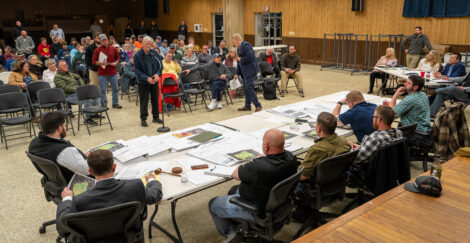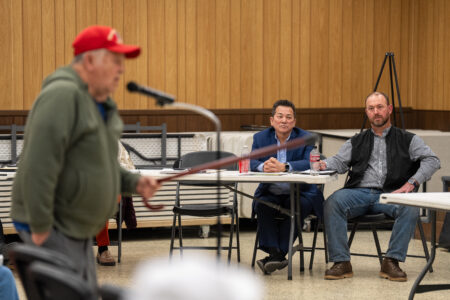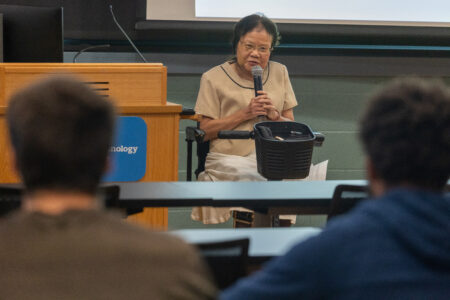‘Quality matters’: Developers answer questions about housing proposal in Wolf Township, Hughesville
- Visitors to the Wolf Township planning commission voice their concerns about the Kim Estates site at the start of the meeting. Dozens attended the meeting, which was standing room only at the beginning. During the public comment about a dozen voiced their concerns with a few supporting the proposed plans. Developers hope to start work on the project in 2026. DAVE KENNEDY/Sun-Gazette
- Dave Kim, owner of the Kim Estates land, and Jason Dohl project contractor, listen to public comments during the Wolf Township planning commission during public comment about the Kim Estates site before the start of the meeting. Dozens attended the meeting, which was standing room only at the beginning. During the public comment about a dozen voiced their concerns with a few supporting the proposed plans. Developers hope to start work on the project in 2026. DAVE KENNEDY/Sun-Gazette
- Visitors to the Wolf Township planning commission look over the plans for the Kim Estates site before the start of the meeting. Dozens attended the meeting, which was standing room only at the beginning. During the public comment about a dozen voiced their concerns with a few supporting the proposed plans. Developers hope to start work on the project in 2026. DAVE KENNEDY/Sun-Gazette
- Dave Brown of Hughesville voices his concerns at the Wolf Township planning commission during public comment about the Kim Estates site during the meeting. Dozens attended the meeting, which was standing room only at the beginning. During the public comment about a dozen voiced their concerns with a few supporting the proposed plans. Developers hope to start work on the project in 2026. DAVE KENNEDY/Sun-Gazette
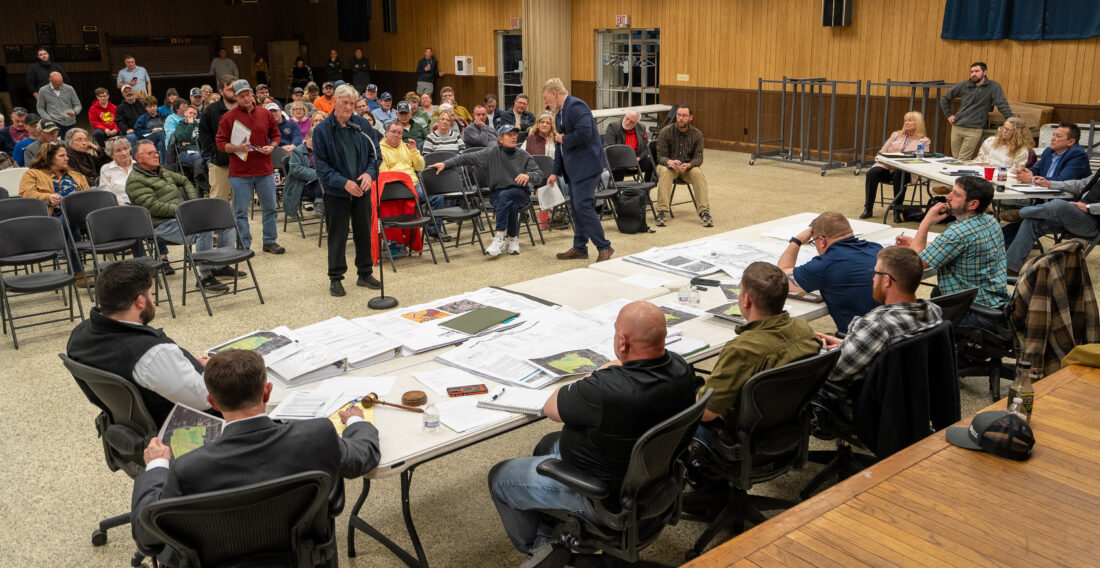
Visitors to the Wolf Township planning commission voice their concerns about the Kim Estates site at the start of the meeting. Dozens attended the meeting, which was standing room only at the beginning. During the public comment about a dozen voiced their concerns with a few supporting the proposed plans. Developers hope to start work on the project in 2026. DAVE KENNEDY/Sun-Gazette
About 100-plus people attended a Wolf Township Planning Commission meeting at the Hughesville Volunteer Fire Department social hall this week to hear more about the proposed Kim Estates, a 124-unit housing development that could be built in three phases over the next few years.
It’s among the largest housing developments in recent memory in eastern Lycoming County.
The project design shows about 68 acres in a residential-urban zoned district, most of which is in the township, with a small sliver in the borough. The design plan, which is flexible at this point, shows a three-phase process to build townhouses, duplexes and single-family houses, add roadways to access the borough and Route 220, and what eventually will be five total stormwater retention basins along with stormwater management concepts to slow down the runoff heading into the borough and township properties.
The housing plan revealed by Dewberry Engineering of Mechanicsburg shows 18 four-unit town houses, 28 single-family dwellings and 24 duplexes for a total of 124 units. Earlier versions of 130 units have been revised, and plans could change again.
The meeting was a chance for the community to hear from the developer and land owner directly.
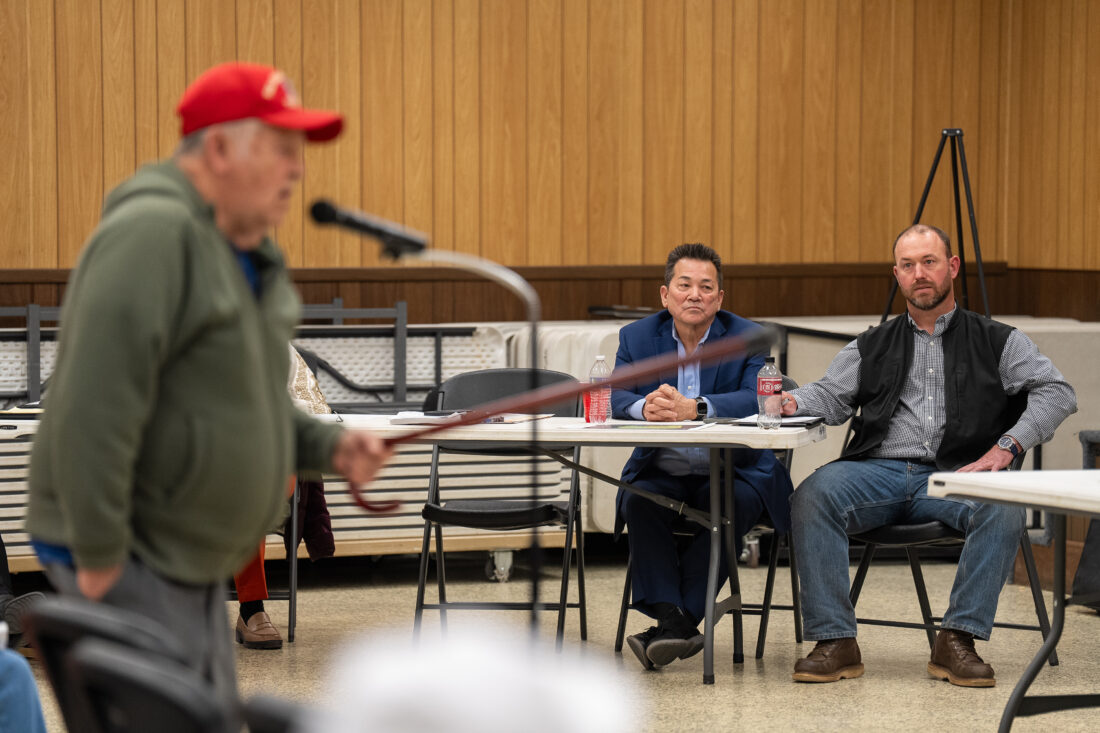
Dave Kim, owner of the Kim Estates land, and Jason Dohl project contractor, listen to public comments during the Wolf Township planning commission during public comment about the Kim Estates site before the start of the meeting. Dozens attended the meeting, which was standing room only at the beginning. During the public comment about a dozen voiced their concerns with a few supporting the proposed plans. Developers hope to start work on the project in 2026. DAVE KENNEDY/Sun-Gazette
“We’re hoping for next spring,” said Jason L. Dohl, president of Dohl General Construction LLC, 32 N. Main St., the general contractor chosen by ILK Family Inc. — the land owners, or the Kim Family, which was represented by David Kim at the meeting.
The meeting was an opportunity for the developers to share their vision, and for members of the community to step up to a microphone and ask questions, some of which helped to guide Dewberry officials and are part of the record for the planning commission.
Early stages discussed, hypotheticals shared
Dohl acknowledged this project is in the preliminary stages with further design and permitting needed.
The development would help to address the county’s shortage of housing and be an indirect and beneficial influence to the revenue of local businesses, and increase the student body population in the East Lycoming School District, he said.
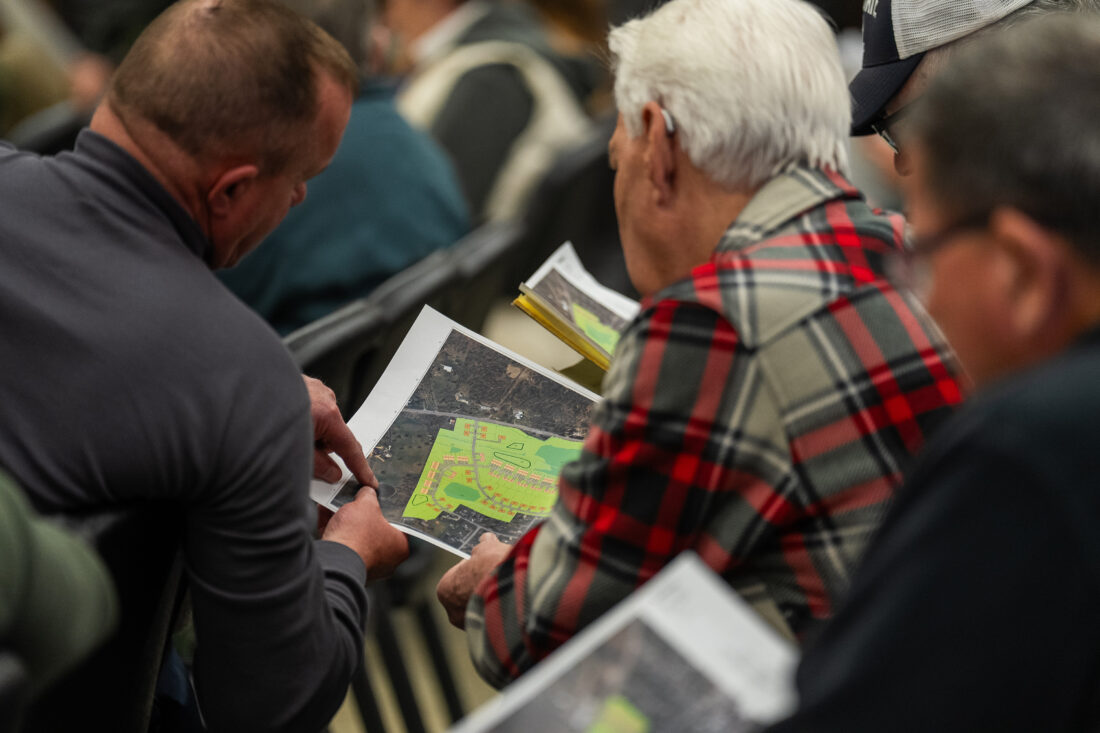
Visitors to the Wolf Township planning commission look over the plans for the Kim Estates site before the start of the meeting. Dozens attended the meeting, which was standing room only at the beginning. During the public comment about a dozen voiced their concerns with a few supporting the proposed plans. Developers hope to start work on the project in 2026. DAVE KENNEDY/Sun-Gazette
Dohl has experience building homes and properties, having completed nearby Wolf Run — consisting of 29 townhomes — and the Wolf Run Assisted Living Center.
At the meeting, Dohl expressed high hopes for the proposed development coming to fruition.
“I’m trying to do something nice here,” he said, acknowledging a development of this size is going to face questions, obstacles and opposition and, possibly, require adjustments.
Dohl has full intentions of building a construction team made up of as many local, reputable contractors as can be found, he added.
“That matters, quality matters,” he said.
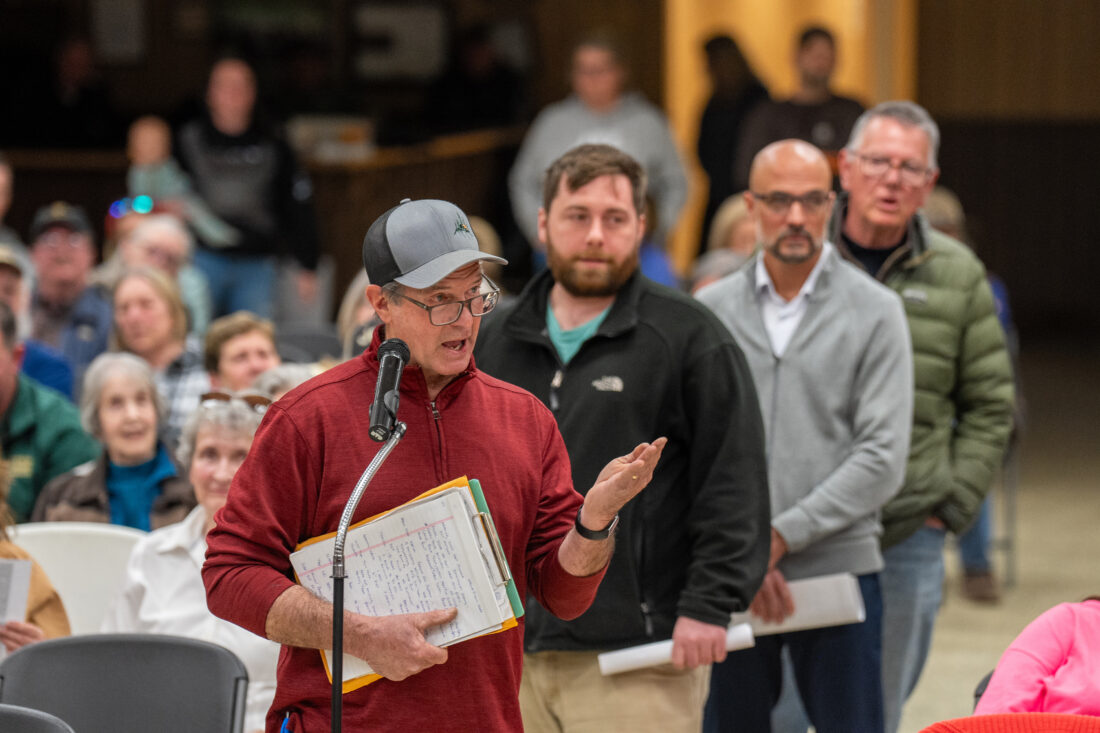
Dave Brown of Hughesville voices his concerns at the Wolf Township planning commission during public comment about the Kim Estates site during the meeting. Dozens attended the meeting, which was standing room only at the beginning. During the public comment about a dozen voiced their concerns with a few supporting the proposed plans. Developers hope to start work on the project in 2026. DAVE KENNEDY/Sun-Gazette
Management of stormwater runoff to handle a 100-year flood
The common theme of the night was concern about the impact on the floodplain and stormwater runoff affecting nearby residential properties.
The design for the retention basins is for a 100-year storm, said Dewberry Engineer Inc. engineer Todd Gittings.
Another question repeated by some in attendance was about the $1 million ILK Family LLC obtained.
For kick-off financing, the county provided a $1 million housing initiative grant. The money is not for the housing construction itself, but is to off-set the cost of the domestic water and sewer expenses, Dohl said.
“It came from the Affordable Housing Act and people thought it was for Section 8 and it is not,” he said. “It is a chunk of money designed to lower the development impact.”
The starter funds make it more appealing for the developer because of the overall costs of a project of this size and scope.
School district input
Hughesville Junior-Senior High School and Ashkar Elementary School are neighbors of the proposed Kim Estates, and because of this, East Lycoming School District Superintendent Dr. Mark Stamm’s primary concern expressed was the potential impact of stormwater runoff, which was addressed in the design comments of the stormwater plan from Dewberry.
Stamm has been briefing the school board, the public and the media about the district’s planning ahead for the eventuality of the development and the challenges it poses in regards to stormwater management.
Stamm has been cautiously optimistic about the township addressing runoff and has explained how the district has a $25 million bond for various capital improvement projects and a plan to invest $1.3 million in a long-term stormwater management plan.
In his statement to the commission, he reiterated that investment is happening and answered numerous similar questions about the district being capable of handling any of the incoming student body population increase as a result of families moving into Kim Estates.
But the primary concern and significant challenge on his mind was to ensure that what is done by Dewberry includes a review of the hydrological data studies done for the district of its own stormwater management plan that covers an area from Cemetery Street to past Boak Avenue.
“I don’t want to see this development undo all of that hard work,” Stamm said.
Later, the Sun-Gazette learned that Dewberry has been corresponding with Larson Design Group, the district’s engineering firm, as part of the plan.
Stamm stressed that whatever is designed by Dewberry and implemented in the construction phase needs to be “more than robust enough to protect the investment that is downstream at the Hughesville High School campus.”
Gittings said they have designed the stormwater runoff plan to be 50% more than what is required by regulations.
Demographics of homeowners
Some of those at the meeting expressed interest about who might be the eventual owners of the properties, which Kim said would be in the $300,000 to $500,000-plus range, but which could be more for a homeowner who asked for customized builds and additions.
“Who is this being built for?” asked Zac Renn, who said he had experience in the building industry.
Kim answered by saying there will not be any short-term rentals. Rather, the Kim family prefer these homes be purchased.
“No transient rentals,” he said.
Julie Sholtis asked what the benefits to the community might be.
“It is going to increase your revenue for the township,” Kim said. “It is, hopefully, going to increase your local business. We are not doing low-income housing. That is a misnomer that I have been seeing on social media. It should increase your property value, too.”
What inspired the plan
Kim shared a bit of the history leading up to the housing development proposal. He’s heard about it being a swamp, but it truly was his father’s vision to see this land become used for a more meaningful and substantive purpose, he said.
His father is affectionately known as “Dr. Kim,” a retired, well-known physician and surgeon who originally lived on Academy Street and then built a home on part of the farmland adjacent to the development, on about 30 acres, where he made his homestead.
Kim said he grew up in the community and attended the school district.
“Our family decided on this idea and to do a feasibility study,” he said.
Just before the COVID-19 pandemic struck, Kim said he met with Dohl about transforming the land in a way his father had always envisioned.
To make it happen, Dewberry was chosen, which Dohl and Kim considered to be one of the most thorough of the engineering firms available. Kim said he was going after a quality engineering firm, not necessarily the least expensive.
Potential impacts to the residents nearby
The project does impact more than one municipality. Various streets in the borough and township will be impacted by the entrances and exits, and it will likely bring in more students.
Resident Harry Rogers mentioned his concerns about the increased traffic on Route 220.
“Lime Bluff Road has at least one or two accidents every year,” Rogers said, adding another question about the potential for 250 or more students to be enrolled in the district, and whether the district could handle that increase.
As for the highway, a Highway Occupancy Permit will need to be submitted to the state Department of Transportation (PennDOT). Access to the development includes two roads entering and exiting busy Route 220. One other access road connects with Cardinal Drive and one road connects to the west end of Academy Street, Gittings said.
In terms of other public works borough impacts, Todd McCowan, a borough resident, noted one parcel in the borough limits will be an “undue burden” on the borough taxpayers. His concern was the township will collect the tax revenue and the borough will collect none.
Dohl said McCowan’s point was valid, especially pointing out the potential for 150 to 300 extra vehicles causing additional maintenance needs like wear and tear and that burden shifted onto the borough. Dohl said he could not answer about the traffic, but, as Kim alluded, he said the extra residents will have a positive effect on the business district in the borough and townships and surrounding areas, including the restaurants, stores, gas stations and retail shops.
In terms of disturbing natural habitat of the site, nearby resident Suzanne Holmes expressed her concerns about wildlife displacement and wetlands impacts.
Gittings said that wetlands would not be impacted by the development as planned. Legally, these wetlands can’t be disturbed and there will be buffer zones and open space on the final design.
The portion that is in the borough contains one of the stormwater management basins and portions of single-family dwellings, according to the plan.
While the majority of the development is in the township nearby homeowner Fred Odell said he was concerned about property values and stormwater drainage in areas that are already frequently flooded.
He also urged Dewberry engineers to review the geological data available about the soil in this area, especially Cardinal and Randy Drive area. “Fred also had good concerns,” Dohl said. Dewberry’s team has done soil drilling and core samples. The team is aware of the soil and its composition, Gittings noted.
Other residents of the area also contributed to the conversation.
Borough resident Dave Brown admitted he walked around the private property, showing it to a county commissioner.
Brown said the commissioner he spoke with thought it was a “beautiful spot.” Brown replied, “no no, no … have you ever had boots on the ground? It is a swamp.” “I do know why the county commissioners are adamant about this. I don’t know why. I have my suspicions.”
Brown then countered how this issue of opposition was not about having new residents move into the area, and he described numerous housing developments in the borough and surrounding townships in which there have not been any community concerns.
“Any piece of property around Hughesville that isn’t presently farmland is developed,” Brown said, adding “there are five designated wetlands” on the site, which he said was not suitable for development. “I have walked that property probably more than you have.”
When Kim heard that, the land owner asked: “Did you ever ask permission to walk on our land?”
It was a reaction to the admitted trespassing on unposted property that caused rumbling in the room, and Bryan Boyer, commission chairman, use his gavel to maintain order.
In terms of heavier traffic on Route 220, Paul Barrett, who lives along Route 220 on Wolf Run Road, said he is more worried about that than anything. He said the 124-unit housing development would mean 200 to 240 cars that are going one way or the other up or down the highway.
“Could somebody make no-pass zone from Interstate 180 to Hughesville? Because they have a lot of passing zones and crazy drivers,” he asked the commission.
The state highway is controlled by PennDOT. The commission said they could certainly look into his concerns about no passing zones in their jurisdiction.
As for the timeframe and goals, Dohl said he wanted to start infrastructure construction in spring 2026, but noted the design needs to be finalized and all permits approved.
Building permits are less of a time consuming effort but the land development could take between three and six months, he said.
Dohl wants to start infrastructure construction earlier, if possible he said.

